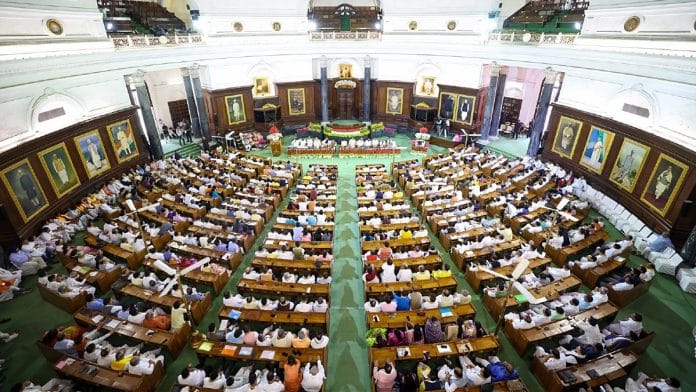New Delhi: National Democratic Alliance (NDA) led by the Bharatiya Janata Party (BJP) is set to form the government for a third time. But the NDA, with a combined strength of 293 Lok Sabha MPs, does not have a single MP from the Christian, Muslim or Sikh communities.
It does, however, have a Buddhist MP in former Union minister Kiren Rijiju who defeated Congress’s Nabam Tuki to retain his parliamentary seat of Arunachal West.
While 33.2 percent of NDA MPs are from Upper Castes, 15.7 percent from Intermediate Castes and 26.2 percent from Other Backward Castes, none are from the Muslim, Christian or Sikh communities, according to an analysis in The Hindustan Times.
At the same time, the analysis by political scientist Gilles Verniers reveals that Muslims account for 7.9 percent, Sikhs for 5 percent and Christians for 3.5 percent of the 235 MPs of the INDIA bloc.
The analysis also shows that Upper Castes, Intermediary Castes and OBCs make up 12.4 percent, 11.9 percent and 30.7 percent of INDIA bloc’s strength in the Lower House.
Also Read: Did BJP strike rate improve after Modi’s ‘anti-Muslim’ rhetoric? Here’s how it fared in all 7 phases
Muslim MPs in 18th Lok Sabha
Of the 24 Muslim MPs elected to the 18th Lok Sabha, 21 are from the INDIA bloc. These include seven from the Congress, five from the Trinamool Congress (TMC), four from the Samajwadi Party (SP), three from the Indian Union Muslim League (IUML) and two from the Jammu and Kashmir National Conference (NC).
The remaining three Muslim MPs include All India Majlis-e-Ittehadul Muslimeen (AIMIM) chief and five-time MP from Hyderabad Asaduddin Owaisi and two Independents — Abdul Rashid Sheikh or ‘Engineer Rashid’ in Baramulla and Mohmad Haneefa in Ladakh.
According to an analysis by The Indian Express, 11 major parties fielded a total of 82 Muslim candidates of whom 16 won. Of the 82, five were fielded by NDA constituents, including one by the BJP.
BJP’s only Muslim candidate Dr Abdul Salam came in third, after E.T. Mohammed Basheer of the IUML and V. Vaseef of the CPI(M), in Kerala’s Malappuram Lok Sabha seat. Salam received only 85,361 votes as against Basheer’s 6.44 lakh and Vaseef’s 3.43 lakh votes.
Since the exit of Mukhtar Abbas Naqvi’s term in July 2022, Narendra Modi’s Council of Ministers has had no one from the Muslim community. Naqvi served as the minister for minority affairs from 2014 till 2022.
Christian vote & BJP
As for the Christian community, the BJP’s only Christian candidate in Kerala, Anil Antony came in third in Pathanamthitta seat, after Anto Antony of the Congress and Dr T.M. Thomas Issac of the CPI(M).
Anil is the son of veteran Congressman and former defence minister A.K. Antony. His loss in Pathanamthitta was despite the Believers Eastern Church — reportedly facing an Income Tax probe since 2020 — declaring support for him in the run-up to the Lok Sabha polls.
The BJP did, however, manage to win its first Lok Sabha seat in Kerala. Actor Suresh Gopi won the Thrissur seat for the party by defeating CPI’s V.S. Sunilkumar and K. Muraleedharan of the Congress by a margin of more than 74,000 votes.
Kerala BJP general secretary George Kurian told ThePrint that the Christian community “backed” the party in several seats including Thrissur. “We got 30 percent of the Christian vote in Thrissur and 10-12 percent in many other seats. We even did well in Trivandrum.”
He, however, added that the party has to do much more to win over Kerala’s influential Christian community.
Asked about his take on why the Congress-led United Democratic Front (UDF) did well in Kerala, Kurian said, “Like the Sabarimala issue consolidated the Hindu vote in 2019, this time Muslim consolidation in favour of the Congress made a difference.”
Besides Kerala, the BJP and its allies also suffered a setback in Christian-dominated states in the Northeast, in particular Nagaland and Meghalaya. Without naming Christians, Assam Chief Minister Himanta Biswa Sarma, who is also convener of the BJP-led North East Democratic Alliance (NEDA), even claimed that “a particular religion” had voted against NDA constituents in these states.
For the NDA, the only exception in the Northeast was Arunachal Pradesh where it not only won the state’s two Lok Sabha seats but also returned to power in the assembly elections held simultaneously.
A Manipur BJP leader told ThePrint, “Even our strong state minister (Basanta Kumar Singh) could not win the election since both tribal and Christian voters were upset. Our allies too suffered losses in Meghalaya and Nagaland. We were neither able to sense this resentment among the Christians nor go for course correction.”
John Barla who was elected to the Lok Sabha in 2019 from West Bengal’s Alipurduars seat was the only Christian minister in Modi’s Council of Ministers. He served as Minister of State (MoS) in the Ministry of Minority Affairs from 2021 till this year.
BJP’s Sikh candidates
This time, the BJP fielded six Sikh candidates in Punjab: Preneet Kaur in Patiala; Parampal Kaur Sidhu in Bathinda; Ravneet Singh Bittu in Ludhiana; Taranjeet Singh Sandhu in Amritsar; Rana Gurmit Singh Sodhi in Firozpur; and Manjit Singh Manna in Khadoor Sahib.
This was the first time since 1998 that the party contested a Lok Sabha election in Punjab without being in a pre-poll alliance with the Shiromani Akali Dal (SAD).
Even outside of Punjab, BJP’s Sikh candidate S.S. Ahluwalia was defeated by Shatrughan Sinha of the TMC in West Bengal’s Asansol.
Also Read: Muslims made their vote count. This time Hindus built a coalition with them






